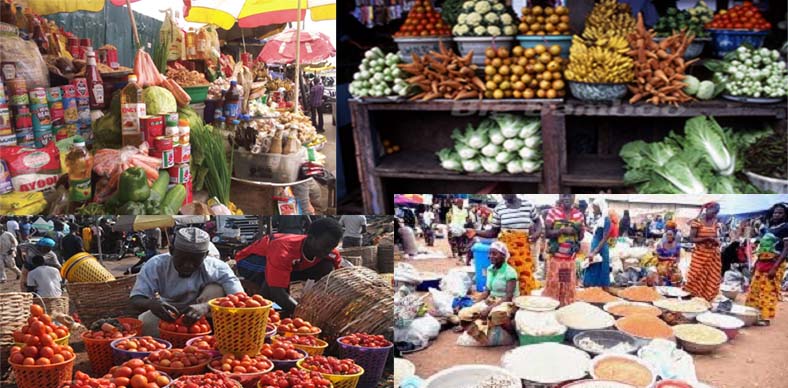Corruption and Inefficiency: Root Causes of Nigeria’sFood Crisis
In Nigeria, the daily struggle for survival is intensifying as Nigeria’s food crisis keeps rising. The cost of food is skyrocketing, with food inflation creeping up to 40.66 percent from 40.53 percent, according to the National Bureau of Statistics (NBS).
This is not just a statistic; it is a reflection of the harsh reality that millions of Nigerians face every day. Despite this, wages remain stagnant, and insecurity continues to disrupt daily life, leaving families in a precarious position.
Join our WhatsApp ChannelPrime Business Africa reports that many experts argue that corruption and inefficiency within the government are exacerbating Nigeria’s food crisis. Funds meant for agricultural development and food security are often siphoned off or mismanaged, leaving farmers without the necessary resources to increase production and improve food supply chains.
“Agricultural funds are being diverted to private accounts instead of reaching the farmers who need them the most,” says Adeola Ogunleye, an economist and anti-corruption advocate.
Misallocation of Resources and Agricultural Neglect
The misallocation of resources is a notable issue. Instead of investing in modern farming techniques, irrigation systems, and infrastructure, funds are often misappropriated, leaving the agricultural sector underdeveloped. As a result, food production is insufficient to meet the growing demand, leading to higher prices and increased hardship for Nigerians.
The Prime Business Africa survey highlights the desperation: the price of basic food items, such as tomatoes, has reached 1,000 Naira for four or five small pieces. In response, many are turning to less expensive alternatives like carrots and cucumbers for their meals. This is not a sustainable way of living; it is a clear indication of an economy in distress. A de rica of Rice is around N1,400, Beans are N1,800, etc.
READ ALSO: Why Nigeria’s Food Crisis May Last Longer
Insecurity and its Toll on Agriculture
Insecurity remains a critical issue demanding immediate attention against Nigeria’s food crisis. Security cannot be downplayed or politicised if the Nigeria food crisis is to be resolved. Despite Nigeria’s military presence, insecurity persists unabated, disrupting supply chains and pushing farmers in northern Nigeria to pay militias for protection just to access their fields. The correlation between food supply chains and security is direct and severe.
“Farmers are afraid to go to their farms due to constant threats from armed groups,” said Ahmed Lawan, a local farmer in Kaduna. “This has drastically reduced food production and increased prices.”
Health and Sanitation Crisis: A Consequence of Mismanagement
The public health crisis is another pressing issue. The Nigeria Centre for Disease Control and Prevention (NCDC) reports alarming numbers of cholera cases, exacerbated by inadequate waste disposal and flooding during the rainy season.
Access to affordable medicine is another challenge, worsened by the departure of major pharmaceutical companies. This dire scenario underscores the urgent need for effective healthcare solutions.
Dr. Chikwe Ihekweazu, Director General of the NCDC, stated, “The rising cholera cases are a direct result of poor waste management and inadequate health facilities. Immediate intervention is necessary to prevent further spread and fatalities.”
Lessons from Other Nations
India provides a pertinent case study. Recognising the fiscal burden posed by subsidies, the Indian government initiated a phased approach to subsidy removal, coupled with direct cash transfers to the most vulnerable households through the Direct Benefit Transfer (DBT) scheme. This strategy managed inflation and improved the efficiency and targeting of subsidies.
Programmes like the Mahatma Gandhi National Rural Employment Guarantee Act (MGNREGA) provide rural employment and income support, mitigating the adverse effects of rising fuel prices on rural households. India’s approach demonstrates the importance of gradual reforms and robust social safety nets.
In 2016, Egypt embarked on economic reforms with IMF support, including floating the Egyptian pound. This move initially caused a sharp rise in inflation, adversely affecting people with low-income. To counter these effects, Egypt expanded its “Takaful and Karama” programmes, providing cash transfers to millions of families. Structural reforms improved the business climate and attracted foreign direct investment, enhancing economic stability.
A Call for Immediate and Transparent Reforms
Nigeria can draw valuable lessons from these countries. Implementing direct cash transfers to vulnerable households can protect the poorest segments from price shocks. Expanding social safety nets similar to India’s MGNREGA can provide rural employment and income support.
Structural reforms to improve the business climate, attract foreign investment, and enhance fiscal sustainability are crucial.
Additionally, opening borders for the importation of food at cheaper rates and introducing food subsidies can help lower food prices and provide immediate relief to those most affected by rising inflation and economic hardship.
“The government must act swiftly and decisively. Our people cannot continue to endure these hardships indefinitely,” urged Ngozi Okonjo-Iweala, Director-General of the World Trade Organization and former Nigerian finance minister.
The Urgent Need for Accountability
Nigerians cannot endure indefinitely under the current economic strain. The continuous pressure of rising prices, stagnant wages, and insecurity is pushing people to their limits.
The government must act swiftly and decisively to alleviate these pressures before the situation reaches a breaking point. If action is taken too slowly, social unrest and economic hardships could worsen and endanger the welfare of the country and its citizens.
The resilience of Nigerians is not infinite. Just as materials have limits to their expansion before they break, so do people’s resilience and endurance under prolonged hardship. The time for action is now before the silent cries of hunger and despair become a roar of unrest and upheaval.
By implementing the proposed solutions and fostering a spirit of national unity, Nigeria can navigate this crisis. With decisive action and collaboration, the country can emerge stronger, with a more robust economy and a social safety net that protects its most vulnerable citizens.
This will not only alleviate the current suffering but also lay the foundation for a more prosperous and sustainable future for all Nigerians.
Emmanuel Ochayi is a journalist. He is a graduate of the University of Lagos, School of first choice and the nations pride. Emmanuel is keen on exploring writing angles in different areas, including Business, climate change, politics, Education, and others.
- Emmanuel Ochayihttps://www.primebusiness.africa/author/ochayi/
- Emmanuel Ochayihttps://www.primebusiness.africa/author/ochayi/
- Emmanuel Ochayihttps://www.primebusiness.africa/author/ochayi/
- Emmanuel Ochayihttps://www.primebusiness.africa/author/ochayi/



















Follow Us